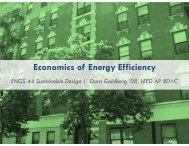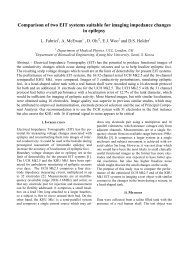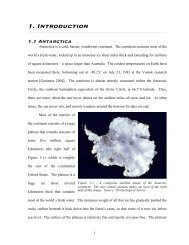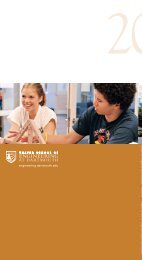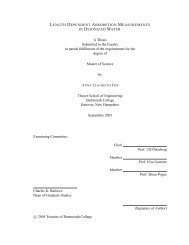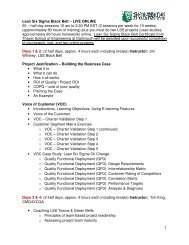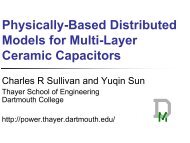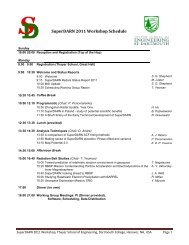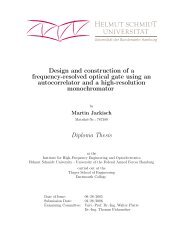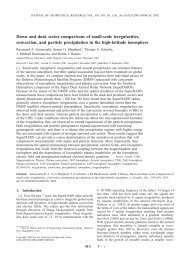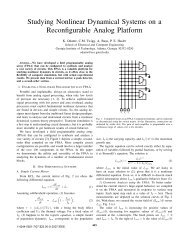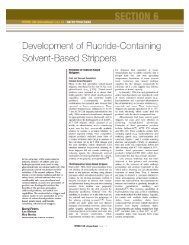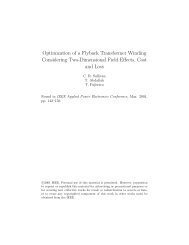Courses Programs - Thayer School of Engineering - Dartmouth ...
Courses Programs - Thayer School of Engineering - Dartmouth ...
Courses Programs - Thayer School of Engineering - Dartmouth ...
You also want an ePaper? Increase the reach of your titles
YUMPU automatically turns print PDFs into web optimized ePapers that Google loves.
undergraduate courses<br />
70<br />
ENGS 23 Distributed Systems and Fields<br />
Offered: 10F, 11F: 2 11S, 12S: 9L<br />
A study <strong>of</strong> the fundamental properties <strong>of</strong> distributed systems and their description in<br />
terms <strong>of</strong> scalar and vector fields. After a summary <strong>of</strong> vector-field theory, the formulation<br />
<strong>of</strong> conservation laws, source laws, and constitutive equations is discussed.<br />
Energy and force relations are developed and the nature <strong>of</strong> potential fields, wave<br />
fields, and diffusion fields is examined. A survey <strong>of</strong> elementary transport processes is<br />
given. Particular attention is given to the relation between the description <strong>of</strong> systems<br />
in terms <strong>of</strong> discrete and distributed parameters. Applications are chosen primarily<br />
from fluid mechanics, electromagnetic theory, and heat transfer.<br />
Prerequisite: ENGS 22 or equivalent<br />
Instructors: Phan (fall), Trembly (spring) Dist: TAS<br />
ENGS 24 Science <strong>of</strong> Materials<br />
Offered: 11W, 12W: 10, laboratory 11S, 12S: 10, laboratory<br />
An introduction to the structure/property relationships, which govern the mechanical,<br />
the thermal, and the electrical behavior <strong>of</strong> solids (ceramics, metals, and polymers).<br />
Topics include atomic, crystalline, and amorphous structures; X-ray diffraction;<br />
imperfections in crystals; phase diagrams; phase transformations; elastic and plastic<br />
deformation; free electron theory and band theory <strong>of</strong> solids; electrical conduction in<br />
metals and semi-conductors. The laboratory consists <strong>of</strong> an experimental project<br />
selected by the student and approved by the instructor.<br />
Prerequisites: PHYS 14 and CHEM 5<br />
Instructors: Frost (winter), Liu (spring) Dist: TLA<br />
ENGS 25 Introduction to Thermodynamics<br />
Offered: 11S, 12S: 2 11X, 12X: 11<br />
The fundamental concepts and methods <strong>of</strong> thermodynamics are developed around<br />
the first and second laws. The distinctions between heat, work, and energy are<br />
emphasized. Common processes for generating work, heat, or refrigeration or changing<br />
the physical or chemical state <strong>of</strong> materials are analyzed. The use <strong>of</strong> thermodynamic<br />
data and auxiliary functions such as entropy, enthalpy, and free energy are integrated<br />
into the analysis. The numerous problems show how theoretical energy requirements<br />
and the limitations on feasible processes can be estimated.<br />
Prerequisites: MATH 13, PHYS 13, and COSC 5 or ENGS 20<br />
Instructors: Griswold (spring), Ackerman (summer) Dist: TAS<br />
ENGS 26 Control Theory<br />
Offered: 10F, 11F: 9L<br />
The course treats the design <strong>of</strong> analog, lumped parameter systems for the regulation<br />
or control <strong>of</strong> a plant or process to meet specified criteria <strong>of</strong> stability, transient<br />
response, and frequency response. The basic theory <strong>of</strong> control system analysis and<br />
design is considered from a general point <strong>of</strong> view. Mathematical models for electrical,<br />
mechanical, chemical, and thermal systems are developed. Feedback-control system<br />
design procedures are established, using root-locus and frequency response methods.<br />
Prerequisite: ENGS 22<br />
Instructor: Olfati-Saber Dist: TAS<br />
ENGS 27 Discrete and Probabilistic Systems<br />
Offered: 11W, 12W: 2<br />
This course is an introduction to probabilistic methods for modeling, analyzing,<br />
and designing systems. Mathematical topics include the fundamentals <strong>of</strong> probability,<br />
random variables and common probability distributions, basic queueing theory, and<br />
stochastic simulation. Applications, drawn from a variety <strong>of</strong> engineering settings,<br />
may include measurement and noise, information theory and coding, computer<br />
networks, diffusion, fatigue and failure, reliability, statistical mechanics, ecology,<br />
decision making, and robust design.<br />
Prerequisites: MATH 8 and either ENGS 20 or COSC 5; PHYS 13 or CHEM 5 recommended<br />
Instructor: Cybenko Dist: TAS



